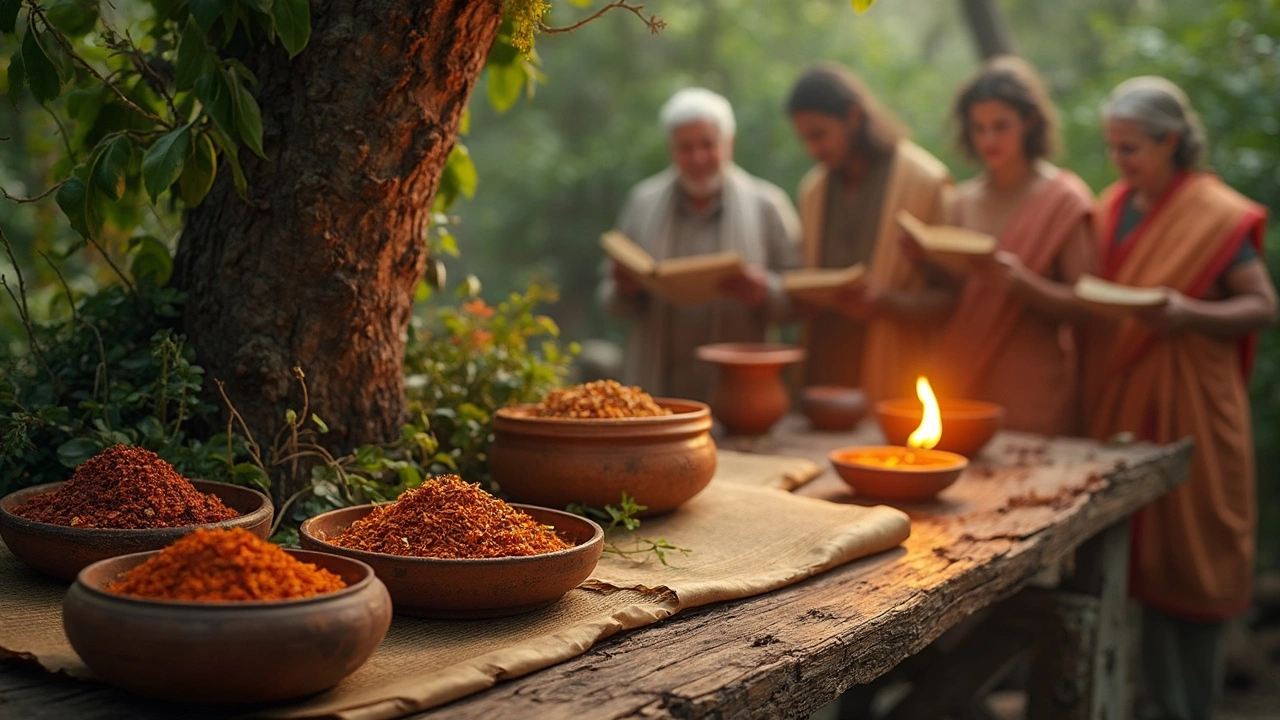If you picked up a bottle of "heart health" supplements lately, there's a good chance you saw one ingredient repeated everywhere: Arjuna. For something that sounds so lyrical, Arjuna’s resume is wild. We’re talking about a tree bark that’s been at the center of Indian medicine for at least a thousand years, and now Western science can’t stop talking about it. There’s even a story that warriors in ancient India relied on Arjuna not just for their hearts but for pure courage. Seems dramatic? Maybe. But once you peel back the label, Arjuna is way more than just another herbal fad.
What is Arjuna? Unveiling the Legendary Tree
Arjuna, also known as Terminalia arjuna, grows big and bold along riverbanks in India’s tropical zones. It’s a tall tree—sometimes hitting 100 feet. You can spot it by its thick, pale grey bark. Here’s what’s funny: while the world obsesses over roots and leaves, Arjuna’s magic lives in its bark. Local healers, or vaidyas, have scraped, dried, and brewed this bark into teas and powders for centuries.
Let’s talk facts. The bark is loaded with compounds called flavonoids (those fancy plant antioxidants), glycosides, tannins, and minerals like calcium, magnesium, and zinc. But why does all this matter? The antioxidant game is strong here. These tiny molecules protect our cells from damage (think pollution, bad diets, stress), and they especially shield heart tissue from wear and tear.
In ancient Ayurvedic texts, Arjuna gets prime placement. Scroll through the Charaka Samhita—a medical text older than some religions—and you’ll find Arjuna credited for treating wounds, balancing the "doshas" (especially the kapha and pitta types), and acting as a lifesaver for the heart. No hyperbole: the Sanskrit nickname for Arjuna actually means "one who saves from disaster."
It’s not just folk legends. In the last couple decades, researchers dove into dozens of clinical trials, and what keeps popping up is Arjuna’s capacity to help with high blood pressure, cholesterol, and even chest pain (angina). Some doctors in India still prescribe it as part of their official cardiac care. Plus, you’ll find it turning up in herbal toothpastes and skincare products, too. Who knew your face wash might owe its astringency to the same bark that helps your heart?

Arjuna for Heart Health: Real Benefits or Just Hype?
If you want numbers, check these out. A 2022 placebo-controlled study tracked 120 men and women with high blood pressure. After just 12 weeks on Arjuna extract, their average systolic blood pressure dropped by a noticeable 10 points, and many said their chests felt "lighter" and less fatigued. Another trial from the All India Institute of Medical Sciences took patients already on prescription heart meds and had them add Arjuna. Within three months, LDL cholesterol dropped an average of 8%, triglycerides fell by 14%, and their exercise endurance went up.
Here’s what else stands out: Unlike a lot of heavy-duty pharmaceuticals, side effects for most people are mild—think a bit of nausea or headache if you overdo the dose. There’s no habit-forming worry, and Arjuna is typically safe when used for months at a stretch. Even so, always run it by a doctor if you’re already popping prescriptions or have a heart condition—that’s just basic sense.
But what's actually happening inside the body? Turns out, Arjuna’s flavonoids and a substance called arjunolic acid help blood vessels relax, lower inflammation, and keep the heart’s pumping action steady during stress. Imagine your cardiovascular system getting a tune-up so the plumbing runs smoother and the engine never sputters. Animal studies even found that Arjuna can help prevent heart muscle damage after a heart attack by quashing rogue free radicals.
Beyond the heart, there’s interesting buzz about Arjuna easing anxiety and stress, supporting kidney health, and helping to stabilize blood sugar. Ayurvedic practitioners often recommend it to people recovering from surgery or illness, claiming it brings energy back and helps the body "renew its strength"—one reason it’s popular among athletes and night-shift workers.
If you’re wondering about the numbers, here’s a look at typical nutrition found in 1 gram of dried Arjuna bark extract:
| Compound | Amount (per 1g extract) |
|---|---|
| Flavonoids | 18-24 mg |
| Tannins | 40-70 mg |
| Arjunolic Acid | 2-5 mg |
| Calcium | 8-12 mg |
| Magnesium | 5-8 mg |
Supplements come in all forms—powders, capsules, teas, and syrup. The classic Ayurvedic way involves boiling bark chips in water for up to an hour and sipping that concentrated tea. Most modern folks prefer the pill version. Standard dose runs from 500 mg to 1000 mg daily for maintenance, but specific doses should be customized.
Never double up for a quick fix—your body won’t thank you with faster results. And watch out if you have shellfish allergies (oddly, some supplements get contaminated during processing factories that handle shellfish, especially in Asia).

How to Choose and Use Arjuna Safely
This is where it gets tricky. Not all Arjuna is created equal. With the surge in popularity, there’s a wild market out there—everything from ultra-pure, organic bark to powders that are 70% filler. Here’s what you need to look for, straight up:
- Check for "Terminalia arjuna" as the only active ingredient. If there’s a laundry list of additives, walk away.
- Third-party lab testing is a must. The best brands will show their test results for heavy metals, pesticides, and purity—avoid anything murky on sourcing.
- Go for standardized extracts (look for at least 20-30% arjunolic acid or “total tannins” for solid heart support).
- Choose companies you can actually call or email. Seriously, if there’s no way to contact them, or their website’s all flash but no substance, it’s probably just hype.
For folks new to Arjuna, start small—maybe a 250 mg dose for the first week, then slowly build up to a maintenance amount if you feel good and have no side effects. Take it with meals to boost absorption. If you’re on blood thinners or already taking antihypertensives, you have to let your doctor know before introducing it. There are rare but real interactions.
Watch for counterfeit supplements especially if you shop online. According to a January 2024 report from the Indian Ministry of AYUSH, more than 17% of so-called "herbal" supplements tested had zero actual Arjuna content! Go for established names—not the cheapest option out there.
Women who are pregnant or breastfeeding should skip Arjuna, since there haven’t been enough solid studies to guarantee safety for the baby. Same goes for little kids. Elderly people usually tolerate it fine, but since some natural compounds thin the blood, they should keep their doctor in the loop.
If you’re into do-it-yourself herbalism, the bark can come as pieces, which you can brew at home. For a traditional Arjuna decoction:
- Take 6-8 grams of dried bark chips (about a tablespoon).
- Boil in 250 mL (one cup) of water for 45 minutes, until half the water evaporates.
- Strain and sip, once daily after food.
The flavor? Earthy and astringent with a slightly bitter, woody punch—not the worst, honestly, but add a bit of honey or lemon if you need to disguise it.
People often ask about stacking Arjuna with other herbs. It often pairs well with hawthorn for extra cardiovascular support or ashwagandha for stress, but don’t pile on too many at once. If you’re new to herbal medicine, keep a simple log of what you’re taking and any changes you feel—energy, mood, or sleep. That helps you and your healthcare folks figure out what’s working.
And for anyone with a curiosity about plants and wellness, learning about Arjuna is like cracking open a book that’s part legend, part hard science, and part everyday health hacks. Its reputation as a heart health champion is based on centuries of daily use—plus a growing pile of clinical evidence. Going forward, Arjuna’s not just riding the wave of tradition—it’s paving a very modern, very natural road to stronger hearts and better living.


Jonathan Martens
June 26, 2025 AT 23:25Oh great another “miracle” bark that claims to coordinate a cascade of enzymatic upregulation via flavonoid‑mediated transcriptional activation while the rest of the supplement market pretends to be novel.
Jessica Davies
July 10, 2025 AT 19:08One must not be seduced by the romanticised narrative of ancient warriors; the empirical data, while superficially impressive, fails to account for confounding variables and methodological shortcomings.
Kyle Rhines
July 24, 2025 AT 14:51The article neglects to address the pervasive mislabelling that plagues the herbal supplement industry.
For instance, many products advertised as terminalia arjuna contain negligible amounts of the bark, a fact corroborated by independent lab analyses.
Such discrepancies are not accidental but stem from a supply chain orchestrated by entities that profit from the illusion of natural efficacy.
Moreover, the use of the term “clinical trial” is often stretched to include poorly controlled, underpowered studies that lack proper randomisation.
A rigorous appraisal would demand double‑blind, placebo‑controlled designs with sufficient sample size, none of which are consistently presented.
The authors also overlook the fact that arjunolic acid, while biologically active, is present in concentrations that vary wildly between batches.
Batch‑to‑batch variability can render dosage statements meaningless, leading consumers to either underdose or inadvertently overdose.
Regulatory oversight in many jurisdictions is minimal, allowing manufacturers to skirt safety testing under the guise of “tradition”.
This regulatory vacuum is further exploited by marketing firms that deploy pseudo‑scientific jargon to create a veneer of legitimacy.
One should also consider the potential for heavy‑metal contamination, a documented risk in herbs harvested from industrial riverbanks.
Historical use does not equate to universal safety; ancient practitioners lacked the diagnostic tools we possess today.
Therefore, a blanket recommendation without individualized medical supervision is irresponsible.
In addition, interactions with anticoagulant medication have been reported, suggesting that the bark may possess mild antiplatelet activity.
Patients on warfarin or newer direct oral anticoagulants should be especially vigilant.
The article’s claim of “mild side effects” fails to acknowledge the seriousness of possible hemorrhagic complications.
Finally, the narrative omits the socioeconomic dimension, where low‑income consumers are targeted with cheaper, adulterated products.
A comprehensive risk‑benefit analysis must incorporate these hidden costs before endorsing arjuna as a universal heart‑health solution.
Lin Zhao
August 7, 2025 AT 10:35I appreciate the depth of the critique, yet it’s also worth noting that many traditional preparations have stood the test of time and continue to provide measurable benefits 😊.
Modern standardisation can bridge the gap between anecdote and evidence, fostering safer integration into contemporary health routines.
Laneeka Mcrae
August 21, 2025 AT 06:18Here’s the quick rundown: start with 250 mg of a pure terminalia arjuna extract for a week, watch for any stomach upset, then increase to 500‑1000 mg daily if you feel fine.
Make sure the label lists only "terminalia arjuna" and shows a third‑party lab report.
Avoid any product that adds fillers like rice starch or claims to be a “super‑herb blend”.
If you’re already on blood pressure meds, tell your doctor before you begin.
Stick to the dose; more isn’t faster and can cause nausea.
Kendra Barnett
September 4, 2025 AT 02:01Stay consistent, your heart will thank you.